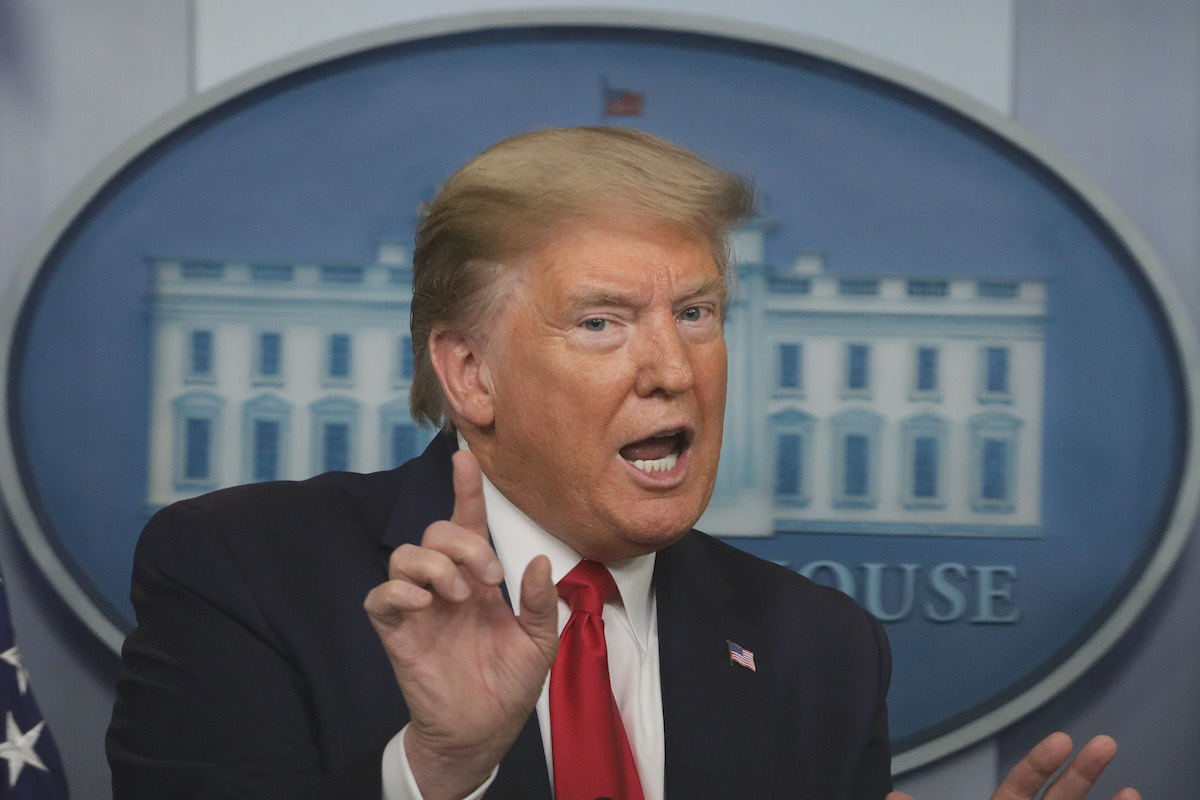If You’re Not Watching Donald Trump’s Daily Press Briefings (and I Hope You’re Not), You Can’t Imagine How Awful They’ve Become

Ostensibly, there should be a reason for Donald Trump’s daily press briefings. They should offer up some information as to where we are in the coronavirus pandemic and the work being done to slow the spread and stop the virus. That’s what New York’s governor Andrew Cuomo and other political leaders give in their briefings. Every day, Cuomo lays out how New York is being affected–how many deaths, how many new cases, whether those numbers have gone up or down, and how the actions of New Yorkers, as well as health professionals, are affecting those things.
Donald Trump’s briefings are … not that.
From the start, Trump’s briefings were heavily propaganda-driven. Every once in a while, Dr. Anthony Fauci or, well, no, that’s pretty much it, would say something resembling a hard truth about our current situation. But for the most part, it’s just been weeks of Trump talking about how great he’s doing, berating the press, accusing the Obama administration of leaving him with no resources, and bringing through an inexplicable parade of corporate CEOs.
Monday’s briefing reached a whole new level of madness, though.
Can you win a Pulitzer for chyrons? pic.twitter.com/uXRehjkOjH
— Erik Anderson (@awards_watch) April 14, 2020
First, Trump played what was essentially a campaign video. It accused the media of treating him unfairly. He backed up this claim using a quote from Maggie Haberman of the New York Times, which I guess isn’t part of the “media” anymore? Again, this is supposed to be a briefing about the virus.
Next, Trump got into a heated argument with CBS News’ Paula Reid. People often say they wish the press would push back against Trump when he tries to give nonsense non-answers to their questions. Well, that’s exactly what Reid did. If you can stomach it, this is definitely a clip to watch. Reid is remarkable here.
President Donald J Trump calms a nation on edge pic.twitter.com/HO6Ou1XJzg
— Andrew Lawrence (@ndrew_lawrence) April 13, 2020
Trump was bragging about having acted so early in his response to the virus. He said that by shutting down our borders (which he didn’t really do), he bought the U.S. a lot of time to prepare. So Reid asked a totally valid question: What did he do with that time that he bought? If Trump became aware of the danger in January, what did he do during the entire month of February as a response? He says that we’d be much worse off if he hadn’t acted so quickly. So Reid would like examples of how. How did his decisions benefit us after he made them? Literally one example would be fine.
The most he says after Reid repeatedly refuses to back down is to say they did “a lot” in February. He says he’ll get her “a list.”
He also called Reid and her whole network “fake” before attacking Joe Biden (???) and saying again that a lot more people would be dead now if he hadn’t acted so quickly. Why didn’t that happen? Again, no specifics. He just says he “did it right.”
The whole month of February.
Trump held campaign rallies —
Feb 10 in New Hampshire
Feb 19 in Arizona
Feb 20 in Colorado
Feb 21 in Nevada
Feb 28 in South Carolina. https://t.co/rVxTlSwqgu— Steven Portnoy (@stevenportnoy) April 13, 2020
During the press briefing, Trump also claimed he, as president, has “the ultimate authority” when it comes to reopening the country, lifting stay-at-home orders and sending people back to work.
“When somebody is the president of the United States, the authority is total and that’s the way it’s got to be. … It’s total. The governors know that,” he said.
Maintaining states’ rights has long been one of the biggest tenets of the Republican party. I mean, it’s one of the fundamental pillars of our country as a whole, but Republican lawmakers and voters alike have really claimed it as one of the core issues for their party. So how do they feel about Trump asserting that state and local leaders “can’t do anything without the approval of the president of the United States”? Maybe we’ll find out when the crickets stop chirping.
One reporter pressed Trump on the issue, asking him where he got the idea that his power is absolute. “Who told you that?” she repeatedly asked him. He never answered.
Trump: “When somebody is president of the United States, the authority is total.”
Nope.
That would be the literal definition of a *totalitarian* government—which our traditions, our Constitution, and our values all rightly and decisively reject.
— Steve Vladeck (@steve_vladeck) April 13, 2020
Trump and his administration were rightly criticized when they stopped giving the traditional daily press briefings last year. Trump has pointed to the criticism he’s now receiving for choosing to give briefings as proof of media bias, saying he can’t win either way. But press briefings are supposed to be about information and that’s not what we’re getting here. These aren’t press conferences, they’re campaign rallies and each one is somehow worse than the one before.
(image: Alex Wong/Getty Images)
Want more stories like this? Become a subscriber and support the site!
—The Mary Sue has a strict comment policy that forbids, but is not limited to, personal insults toward anyone, hate speech, and trolling.—
Have a tip we should know? tips@themarysue.com